Ukraine’s history with Russia leads to conflict
Protestors in New York show their support for Ukraine after recent Russian invasion. The protestors dress in shades of blue and yellow to honor the colors of the Ukrainian flag.
Ukraine, though a relatively new country, has had a turbulent history. Ukraine established their independence in 1991, after the fall of the Soviet Union. Unlike other states, Ukraine was not a country before the Soviet Union, rather a nation no longer wanting to be controlled by communist Russia. On Dec. 1, 1991, 90% of Ukrainian voters pushed for independence, formalizing a referendum for an independent country.
It is impossible to talk about Ukraine without first addressing the current situation. On Feb. 24, Russian forces invaded Ukraine with the desire to retake the country as a Russian state. Since then, there have been citizen-led revolts against these Russian forces, pushing back against this power. There has been no progress in peace talks yet, as the number of civilian casualties rise.
Russia, and its President Vladimir Putin, has shown through these attacks that it believes Ukraine still feels it should control the former Soviet state. These recent attacks have clearly been leaning with this belief.
“I think any connection you can make to the present time is always more appealing, both from a teaching and as a student perspective to say how can I apply what I’m learning? In the real world?” Ryan Miller, U.S. History teacher, said. “For us it lined up perfectly for us, unfortunately, with talking about the Cold War, in tensions with Russia. So we’ve drawn a lot of parallels between those two time periods.”
President Viktor Yanukovych served as prime minister to Ukraine from 2002-2007, and later became president, serving from 2010 to 2014. Before he was president, Yanukovych worked as a mechanic and joined the Communist Party in 1980. After Ukraine gained independence from the Soviet Union, Yanukovych became involved in local government, becoming a favorite in the business community.
Yanukovych was made prime minister in 2002 by Ukrainian President Leonid Kuchma, as they shared a desire to maintain a close relationship with their neighbor, Russia. Backed by Russian President Vladimir Putin, suspicions arose in the 2004 when Yanukovych’s biggest political opponent and pro-Western politician Viktor Yushchenko fell ill in a believed assassination attempt. But it did not matter, as in Nov. Yanukovych was declared the winner of the election. Yushchenkko’s supporters were outraged, taking to the streets in what is now known as the Orange Revolution; their efforts were in vain as Yanukovych was made president despite their protests.
Similar events would repeat themselves, as in Jan. 2010, Yanukovych won yet another close race. After re-entering office, Yanukovych quickly showed his pro-Russia feelings, as he promptly struck a deal with Russian President Dmitry Medvedev. This deal was met with pushback in the Ukrainian government, with many opposing the relationship. Tensions continued to rise until in Nov. 2013, Yanukovych withdrew Ukraine’s support for an European Union deal, resulting in mass protests in Kiev. Yanukovych responded with numerous anti-protest measures that resulted in the deaths of two protestors. Protest casualties continued to rise at Kiev’s Maidan Square, with more than 70 dead at the hands of police.
“I did not understand what was going on. I would have been 23 years old at the time. So to me that wasn’t as big of a focus in my life, but I wish I paid more attention to it. Because I think that it played a big role in establishing that pro Western government is something that I think Putin sees as a significant threat,” Brady Hannigan, World History teacher, said.
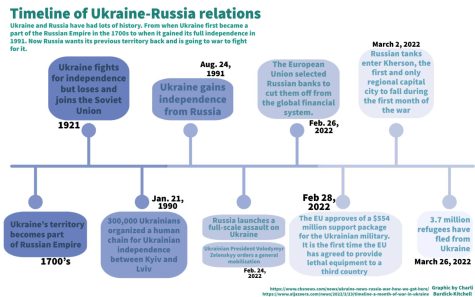
After an attempted impeachment, Yanukovych fled the country after initiating a coup. The Ukrainian government wanted his arrest of the charges of mass murder. Russia offered asylum to the former-president, souring the Ukrainian people’s taste for Russia. With legal action unable to reach him, Yanukovych continued his exile in Russia, where he still resides.
In a letter to world leaders, including the United States, Russia, Germany, France and Poland, Yanukovych stated that the West had been against him from the beginning of his term and defended his actions in what is now called the Maidan Revolution.
“We were right at the time,” Yanukovych stated.
Ukraine, now free from Russian influenced politicians, was able to move towards more western influenced government systems. But this brought criticism and tension from Russia, who still felt ties to the former soviet state.
“A lot of times I feel like the relationship between Ukraine and Russia has a lot to do with animosity towards the split after the Soviet Union,” Hannigan said. “Ukraine was typically a part of Russia and the Soviet Union, but also I think it has to deal with Ukraine wanting to be a part of NATO and leaving that influence of Russia and Putin. I truly believe he [Putin] believes that this is a threat to his country’s stability and the safety of his country.”
This underlying tension has resulted in the current Russian attacks against Ukraine. Most notable, the attacks against Ukrainian’s capital Kyiv, have added further terror and disrespect to the Ukrainian people. Thousands now flee their homes as citizens bear the weight of a former turbulent relationship.

Hi! My name is Sophia Arndt, I'm a senior at SAHS and I work as the Photography Editor-in-Cheif and a Copy Editor. While I'm not a part of any clubs but...


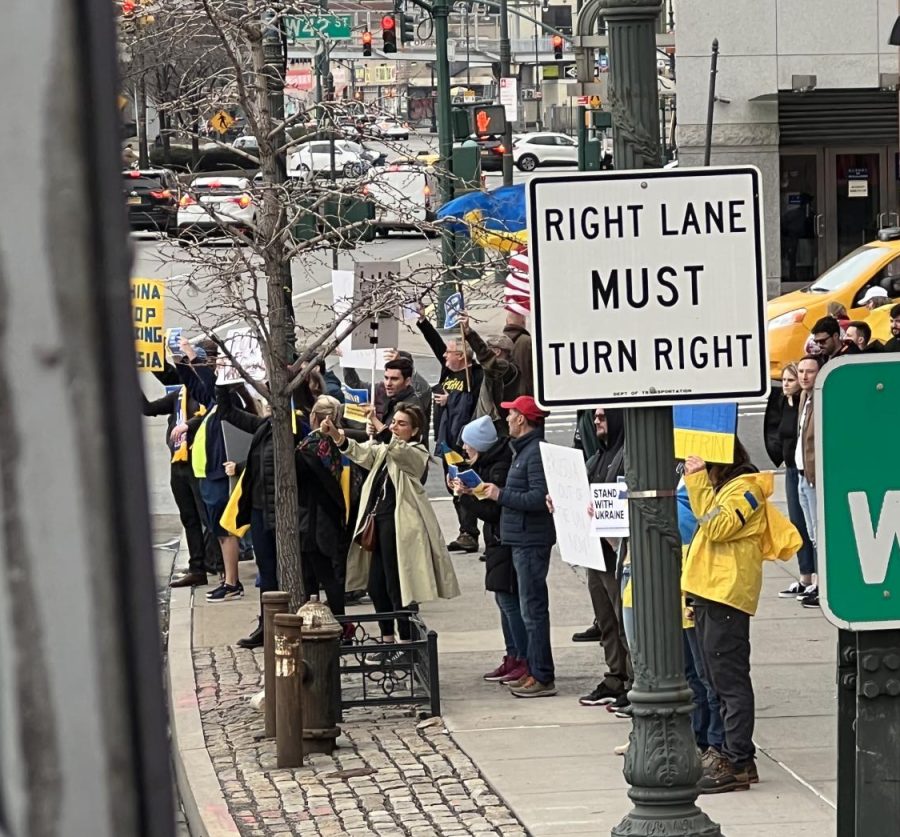
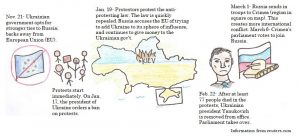
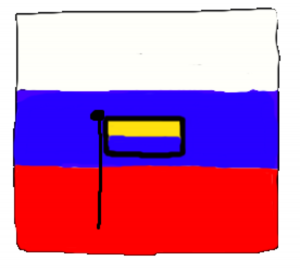
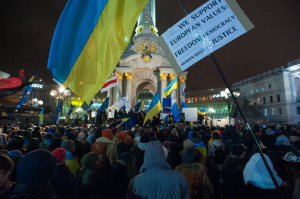
Sumer Harrington • May 16, 2022 at 7:12 am
You are a super strong writer. It’s well researched and very imformative. The topic is super complex and not easily understood but you covered it well. It is also very interesting to read.
Cecilia Conery • May 2, 2022 at 7:07 pm
I really like how you expanded all of the history of Ukraine and Russia’s tension. I feel many people in modern day pay attention to news from today, but may not know all of the context that the events today is following, which is important for everybody to know, even if they live outside of Ukraine/Russia.